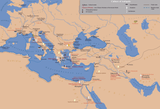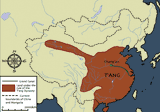
>Religion
Entirely Greek in origin. While the Romans did have their own distinctly native gods early on, they syncretized with Greek ones over the centuries and by the time of the empire, they had effectively just become the Greek ones under different names. The Aeneid itself is just a sequel to the Trojan War
>Architecture
Also entirely Greek in origin.
>Aqueducts
"Roman-style" Aqueducts were originally invented by the Assyrians around the 7th century BCE.
>Intellectuals and Philosophers
Almost all of them came from Greece, Anatolia, the Levant, and Egypt and all wrote their works in Greek.
>Christianity
Stems from Judaism and originally planned on maintaining most of Jewish law until Paul decided that you didn't need to mutilate your dick to join. The New Testament itself was originally written in Greek (the Latin version used by the Catholic Church is a translation of this original Greek version). Constantine the Great was half-Greek and half-Illyrian and was the one who moved the capital from the city of Rome to Constantinople. Many Church Fathers (Origen, Cyril, etc) came from the eastern half of the empire and wrote their works in Greek
>Gladiator tradition
Came from the Etruscans
The only things the Latins themselves excelled in was conquering shit. Even then, they started conscripting more non-Latins as they expanded. Their best emperors weren't even from central Italy (Trajan, Hadrian, Aurelian, Constantine, etc).

>Food
Literally just rehashed Manchu, Mongol, Central Asian, and SE Asian cuisine, with the Portuguese throwing in some New World plants; much of it invented by the new CCP to claim "5000 years of history"
>Language
"Chinese" as we know it today, simplified OR traditional, wasn't invented until after 1900, and before that it was really like 10 separate languages that just happened to use the same writing system and literary form of the language, but Mandarin was chosen among them to be the national languages and is now driving the others into extinction; you wouldn't believe it, but half of all Chinese words (not characters) come from Japanese and were invented as part of the Meiji Restoration, and even many common standalone characters, like "dog" and "river", come from SE Asian languages
>Intellectuals and philosophers
Buddha is openly an Indian import, and a lot of Confucius's ideas are likely lost traces of Jewish monotheism (compare Chinese "Shangdi" to Hebrew "Shaddai")
>Nationhood
The modern notion of "a China" wasn't really a thing until the 1900s; independent unified statehood often separated by centuries of division / foreign rule, with much of the original national identity forgotten, and subsequently artificially "reconstructed"; Chinese out there thinking they're Jews or sth calling themselves the "master race" when genetics tell a much different story (e.g. coastal Chinese people all the way up to north of Shanghai are almost guaranteed to have some kind of SE Asian genetics, and this is even reflected in local dialects)
>Cultural heritage
Many historic national monuments like the most popular Great Wall sections, Tian'anmen Gate, the Terracotta Warriors (I think), and almost all places marketed as "old towns" are 1970s-or-later reconstructions, because Mao destroyed almost all existing cultural heritage during the Cultural Revolution; I've literally been to supposedly "ancient" temples in China that have plaques written in simplified characters
>>17860976 (OP)were arches technically 100% a roman thing, or was that taken from someplace else? columns were 100% greek afaik
also sanitation and cleanliness; soap came from celts and germanics
>>17860976 (OP)Seems like the Latins in particular, out of all the Italics, have the strongest Helleno-Etruscan influence. Maybe the Latins conquered an area that was heavily Etruscan before their arrival.
Somebody tell me the etruscans were pirates
everybody ever was a pirate cove that gained power and influence to take out other pirate coves. Italians were different because of their mixed Celtic roots in the north.
>>17860976 (OP)The Italians were to the Classical World what the Germanics were to their descendants. Barb-Aryan conquerors.
>>17860976 (OP)>Entirely Greek in origin. While the Romans did have their own distinctly native gods early onTherefore, not Greek in origin.
>>17862203I'm referring to the beliefs around the gods. If for example you were to change the Christian god by claiming they're Zeus and just using Zeus's stories around instead of biblical ones, is it still the Christian god or just Zeus under a different name?

>religion
Early Roman gods like Janus and Vesta had no direct Greek equivalents, and syncretism with Greek deities is overplayed. Roman practices like augury and the pontifex maximus role were distinctly Latin.
>architecture
Roman architecture adapted Greek styles but introduced innovations. The Romans developed concrete, which was unknown in Greek architecture. Arches and vaults, extensively used in Roman buildings like the Colosseum, were not Greek in origin but Etruscan and further refined by Romans.
>aqueducts
Assyrian water systems existed, but Roman aqueducts were engineered on a larger scale with precise gradients and arches. Romans standardized and spread this technology across their empire, unlike the former.
>intellectuals and philosophers
Many Roman intellectuals, like Cicero and Seneca, were Latin and wrote in Latin. While Greek philosophers influenced Rome, Roman Stoicism and legal theory were distinct contributions. Latin literature was not derivative of Greek.
>Christianity
Christianity originated in Judea, but its spread in the Roman Empire was shaped by Roman infrastructure and administration. Latin translations like the Vulgate and Roman legal frameworks influenced its institutional development. Constantine’s role was pivotal, but his ethnicity is irrelevant to Roman adoption of Christianity.
>gladiator tradition
Yes, but Romans expanded it into a cultural institution with large-scale amphitheaters and professional schools, distinct from Etruscan rituals.
>the only things the Latins themselves excelled in was conquering
Roman military success relied on organization, discipline, and engineering, not just conquest. Innovations like the legionary system, road networks, and legal codes were Latin contributions. Non-Latin emperors like Trajan were Roman citizens, fully integrated into Roman culture.


